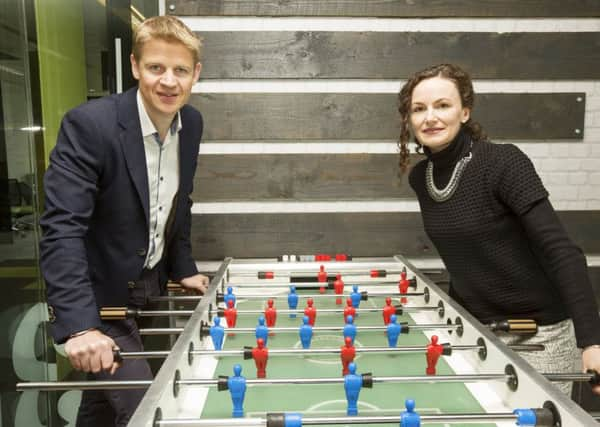Nick Freer: Scotland can create more tech unicorns


It’s been a remarkable year for the digital scene in Scotland, one in which a country much better known for petroleum, golf, whisky and a rain-soaked arts festival in August increasingly attracts the attention of investors and commentators from every corner of the globe.
Only last week, former University of Edinburgh spin-out pureLiFi, led by Bavarian professor Harald Haas, went viral across the world’s media on the back of its patented technology that allows internet use via off-the-shelf LED bulbs. I’ll try to exhaust the superlatives early on, but it’s nothing short of incredible that if you go back five years very few people were talking about Scotland’s fledgling tech ecosystem.
Advertisement
Hide AdAdvertisement
Hide AdIn late 2009, I was invited to a small gathering of academics and techies – computer programmers, developers, coders and so on – at a fairly nondescript co-working space near the Meadows. The email invitation promised pizza, beer and JavaScript. As well as being an Indonesian island, Google told me Java was a programming language, so I did a bit of reading up so I wouldn’t come across as a total chump if put on the spot by a computer nerd type. That evening, one of the first people to say hello was an extremely mild-mannered guy in jeans and a t-shirt who introduced himself as Gareth. When Gareth got up to say a few words to the collected gathering later in the evening, it turned out he was Gareth Williams, the CEO and co-founder of Skyscanner, and suddenly this humble guy came across as very cool and confident… “My name is Gareth and I want to build the first billion-dollar tech company in Scotland.”
For me and a lot of the people I speak to around town, this was a defining moment in Scotland’s tech scene going from fledgling to bona fide. On reflection, the brains behind the global success story that is Skyscanner was not being arrogant, rather he had a single-minded belief in his product and people and, perhaps more than anyone else in that room or indeed in our city or nation at that time, could see the potential for Edinburgh and Scotland to take its place on the world map in all things tech. Again, the man is far too humble to desire a moniker like visionary, but it’s easy to argue that’s exactly what he was. And more importantly, the growing success of his company and his belief in what Scotland had to offer gave much needed confidence to the growing band of tech founders and early stage companies that needed a flag-bearer to look to for inspiration; a kind of belief that “maybe we can do that too”.
Around that time, one such company in need of inspiration and a break or two was FanDuel. The meteoric rise of the company co-founded by Nigel and Lesley Eccles over the past five years proves that Williams’ words were on the money; literally on the money with the combined valuation of Skyscanner and FanDuel now well in excess of $2 billion. There are large international cities that would kill to have two companies in rarefied tech unicorn territory like we have in Edinburgh. Skyscanner and FanDuel have scaled their businesses to great effect – the fact that you can search for travel on Skyscanner’s site in 30 different languages is but one indicator of this – and scaling up is the vogue term of usage inside the tech ecosystem; from the founders, investors and commentators alike.
In May, at Informatics Ventures’ annual EIE investor showcase in Edinburgh, the gathered audience broke into spontaneous and sustained applause as Lesley Eccles told a phoenix-from-the-ashes story of how FanDuel’s previous and less successful incarnation morphed into the current product and business model. Eccles remarked how exciting it was to think about the next early stage ventures that were waiting in the wings – and very probably in the room that day among the exhibiting start-ups.
Tucked between Edinburgh Castle, Edinburgh’s School of Art and the city’s financial centre is the monolithic Argyle House, home to CodeBase, the largest tech incubator in the UK and the place most observers see as producing the next billion-dollar tech companies in Scotland. Administrate, which develops online training software and is run by American CEO John Peebles, is one the companies touted for great things and attracting a lot of interest from the investor community. At the same time, maybe our next tech unicorn has still to be founded.
As we look ahead to 2016, what we can say is that there is every reason to believe we can step the game up another level and produce more Skyscanners and FanDuels. We are building a narrative in Scotland that is spellbinding (there I go with the superlatives again) but don’t just take my word for it. I was lucky enough to spend some time in the company of Google’s former chief technology advocate and co-creator of Google Earth and Maps, Michael Jones, in Edinburgh last week. He said very much the same. Scotland is now on the global tech map and who better to give our nation an endorsement than a guy from Google who knows a helluva lot about technology and… maps?
Twitter: @freerconsults
Nick Freer is the managing director and founder of The Freer Consultancy